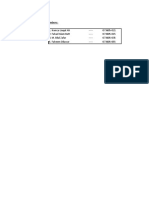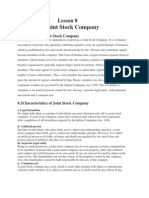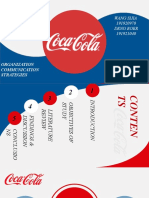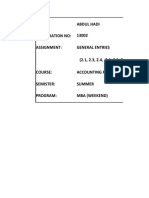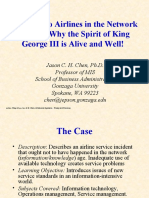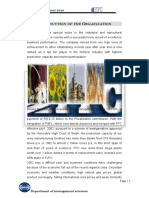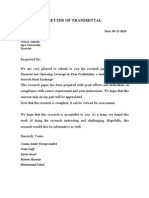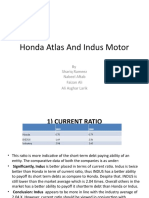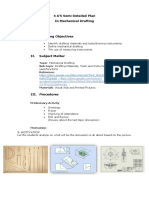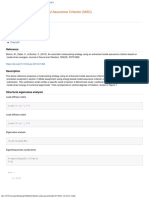Fauji Report
Fauji Report
Uploaded by
Nabeel AftabCopyright:
Available Formats
Fauji Report
Fauji Report
Uploaded by
Nabeel AftabOriginal Description:
Copyright
Available Formats
Share this document
Did you find this document useful?
Is this content inappropriate?
Copyright:
Available Formats
Fauji Report
Fauji Report
Uploaded by
Nabeel AftabCopyright:
Available Formats
Fauji Fertillizer Company
Report on Fauji Fertilizer Company
Business Communication Assignment
Submitted By:
Asad Aftab
Submitted to:
Sir Abdur Rehman
16-3-2015
Textile Institute of Pakistan
Fauji Fertillizer Company
Their motto/slogan is very easy which is
Vision
To be a leading national enterprise with global aspirations, effectively pursuing multiple growth
opportunities, maximizing returns to the stakeholders, remaining socially and ethically responsible.
Mission
To provide our customers with premium quality products in a safe, reliable, efficient and
environmentally sound manner, deliver exceptional services and customer support, maximizing returns
to the shareholders through core business and diversification, providing a dynamic and challenging
environment for our employees.
Corporate Strategy
Maintaining our competitive position in the core business, we employ our brand name, unique
organizational culture, professional excellence and financial strength diversifying in local and
multinational environments through acquisitions and new projects thus achieving synergy towards
value creation for our stakeholders.
Fauji Fertillizer Company
Executive Summary
EXECUTIVE SUMMARY
21% of Pakistans GDP is backed by the agriculture sector and a
hefty 62% of countrys population is
directly or indirectly dependent on agriculture. The A
griculture sectors strong linkages with the rest of
the economy are not fully captured in the statistics. While on the
one hand, the sector is a primary
supplier of raw materials to downstream industry, contributing
substantially to Pakistans exports, on
the other, it is a large market for industrial products such as
fertilizer, pesticides, tractors and agricultural implements. A
thriving agriculture sector is also essential to the prosperity of
manufacturing sector of the economy which mainly consists of
agro based industries such as textiles, sugar, food etc. Fertilizers
are substances added to soil to improve the growth of plants, as
well as their yield. Fertilizer industry in Pakistan is dominated by
two main products; urea (nitrogen based product, accounting for
66% market share) and DAP (phosphorus based product, having
19% market share). Countrys annual
urea demand is approximately 6.5mn tons with local
manufacturing capacity being 5.0mn tons. Delta demand is met
through imports. While Fauji Fertilizer Bin Qasim is the sole
producer of DAP in Pakistan, accounting for 42% of local DAP
Fauji Fertillizer Company
market share, whereas the remaining 58% demand is met
through imports. Due to this high dependence ratio on agriculture
sector, Government has always maintained a transparent and
consistent policy for fertilizer industry regarding, a) fresh
investments, b) input prices, c) supply of inputs. After domestic
consumers, fertilizer industry is placed at priority list when it
comes to rationing of gas. The largest domestic urea producing
companies receive their gas supply from Mari Gas field. Mari field
gas is not pipeline quality due to which there is limited risk of gas
diversion, even if there is shortage of gas in other segments.
The government sets minimum purchase prices of major crops
(wheat, paddy, sugarcane). In the absence of a commodity
exchange, support prices ensure a fair return to the farmers, thus
giving them incentives to invest in these crops. Besides this, the
farmer income is exempt from corporate and general sales tax.
Pakistan is currently deficient in urea production by 1.5mn tons,
but the scenario will change in the next few months once Fatima
Fertilizer and Engro plants comes online. The total urea capacity
of two plants will be around 1.8mn tons. The concerns that the
country may face excess capacity in domestic market leading to
under utilizations or price wars is exaggerated as new urea
capacity of 1.8mn tons is only 0.3mn tons above the current
deficit. The gas load shedding is estimated to reduce domestic
fertilizer production by 0.3-0.6mn tons at least. Looking at current
local demand supply balance, imports, future expansions and gas
curtailment, it is likely that Pakistan will face urea shortage from
2012 and onwards on a conservative basis. Flash floods so far
depict a devastating picture. While final numbers would take time
to shape up, the situation is dire and macro targets for FY11E are
destined to change. In a nutshell we see demand for both urea &
Fauji Fertillizer Company
DAP will be soft in 2010E and should correct in 2011E. The last
instance of excessive flooding in Pakistan (c. Sep 1992
i.e., FY93) resulted in FY93 agricultural growth of -5.3% (from
+9.5%
in FY92). Likewise, the year following 1992 floods, nitrogen
application growth slowed down to +1% while phosphate demand
slipped to -5%. A potential positive for the longer term is that the
present
increase in dams water level may actually bode well for
agricultural growth and fertilizer demand one
year out where lower than mean water availability has stunted
growth in major crops in the last couple of years.
Fauji Fertillizer Company
History
With a vision to acquire self - sufficiency in fertilizer production in the country, FFC was
incorporated in 1978 as a private limited company. This was a joint venture between Fauji
Foundation and Haldor Topsoe A/S.
The initial share capital of the company was 813.9 Million Rupees. The present share capital of
the company stands above Rs. 8.48 Billion. Additionally, FFC has more than Rs. 8.3 Billion as
long term investments which include stakes in the subsidiaries FFBL, FFCEL and associate
FCCL.
FFC commenced commercial production of urea in 1982.
FFC was established in 1978 as a joint venture of Fauji Foundation and Haldor Topsoe. The
first urea complex was commissioned in 1982. Plant-1 was improved in 1992, and a second
plant was built in 1993. In the year 2002, FFC acquired ex Pak Saudi Fertilizers Limited (PSFL)
Urea Plant situated at Mirpur Mathelo, District Ghotki from National Fertilizer Corporation (NFC)
through a privatisation process of the Government of Pakistan. This acquisition at Rs. 8,151
million represents one of the largest industrial sector transactions in Pakistan. FFC now has
three plants with a combined capacity of 5770 MTPD of prilled urea.
Fauji Fertilizer Bin Qasim Limited (FFBL) is another company where FFC has controlling shares
it produces 1670 MTPD of granular urea plus 2250 MTPD DAP after revamping (1350 MTPD
before revamp) DAP. Ammonia and urea plants capacity factors right from the plants start-up
have been 100% or more. Today, FFC is also involved manpower training and turnaround
services provider, especially within Pakistan and in the Middle East.
Fauji Fertillizer Company
Fauji Fertiliser Bin Qasim would enter meat, dairy and power businesses with an estimated
investment of over Rs 33 billion ($ 330 million). The wholly owned subsidiaries of Fauji
Meat, Fauji Foods and Fauji Power will be involved in these businesses
OUR CORE VALUES
At FFC we seek uncompromising integrity through each individuals effort towards quality product for our
customers, maximizing returns to the shareholders and sizable contribution to the national exchequer.
Our business success is dependent on trusting relationships. Our reputation is founded on the integrity of
the Companys personnel and our commitment to the principles of:
Honesty in communicating within the Company and with our business partners, suppliers and customers,
while at the same time protecting the Companys confidential information and trade secrets.
Excellence in high-quality products and services to our customers.
Consistency in our word and deed.
Compassion in our relationships with our employees and the communities affected by our business.
Fairness to our fellow employees, stakeholders, business partners, customers and suppliers through
adherence to all applicable laws, regulations and policies and a high standard of moral behavior.
Fauji Fertillizer Company
Examples of Premium Quality
Products
Sona Urea
Sona Urea is the most concentrated solid, straight nitrogenous and most widely used fertilizer in the
country. Mostly it is manufactured in the form of prills, but FFC is producing in prilled as well as granular
forms.
DAP
Sona DAP is the most concentrated phosphatic fertilizer. It is the widely used phosphatic fertilizer in the
world as well as Pakistan.:
Fauji Fertillizer Company
FFC SOP
SONA BORON
Production and Sale at a Glance
FFC is a leading manufacturing company with over 60% shares of urea manufacturing and marketing in
Pakistan.
Sale (Met/Year)
Urea Production (Met/Year)
Years
Goth Machi
Plant-I
M.Math
elo
Plan
t-II
Total
Urea
Domesti
c
Urea
Export
Urea
Imported
Pho
s*/
Pota
ssic
To
tal
PlantIII
2010
867,
346
806,5
89
810,7
06
2,484,
641
3,006,
074
2011
841,
755
782,7
52
711,1
95
2,395,
702
2,839,
162
722,766
662,387/
9,588
3,728,840
3,511,353
Fauji Fertillizer Company
2012
799,
432
772,3
07
834,0
54
2,405,
784
2,677,
668
677,917/
6,489
3,362,286
2013
774,
835
803,2
87
829,6
00
2,407,
722
2,635,
287
845,383/
7,795
3,488,706
Urea Market Participation
FFC is a leading manufacturing company with over 60% shares of urea manufacturing and marketing in
Pakistan.
IT Vision
The IT Strategy at FFC shall complement our Corporate Vision by business transformation through
technology innovation, introducing best practices and connecting our processes for timely information
and optimized performance to succeed in our endeavors.
Fauji Fertillizer Company
Information Technology
The Company shall continue its focus on realignment of its IT capabilities with the corporate objectives.
With the passage of time, our SAP ERP continued to mature while several new initiatives were
undertaken to bring value to users, across the organization.
Business Planning and Consolidation
In order to enhance management control, a state of the art Business Planning and Consolidation (BPC)
solution has been implemented with the objective of providing online budget preparation and monitoring.
The implementation of SAP BPC solution is the first of its kind in Pakistan. Coordinated from HO, FFC
users joined from all over Pakistan t to carry out the system implementation. The method, though
challenging, reduced the cost of implementation manifolds.
Shipment Planning and Processing Application (SPPA)
Several initiatives centered on improved intercompany accounts, credit and transportation management
were undertaken and completed.
In relation to transportation cost which represents the largest component of distribution cost, a custom
application "Shipment Planning and Processing Application" (SPPA) was made available to users in FFC
for optimization and better management of the transportation function.
Mobility & GIS
The first step towards a mobile enabled business was undertaken by connecting SAP database with SMS
service, for timely availability of sales orders and shipment information to our marketing field force.
Another application was designed in coordination with marketing and the R&D cell at HO, utilizing
databases of soil analysis with a Web based GIS map of Pakistan. The application has the potential of
becoming a potent tool at all levels of the sales and marketing function. Mobile applications have also
been deployed for recording and retrieving soil analysis data based on GPS coordinates.
The application will considerably enhance accuracy of recommendations made to farmers.
Enterprise Central Component 6.0
A major advantage of SAP is access to latest enhancements of business solutions. In order to leverage
this facility, SAP ERP was upgraded to the latest enhancement package of Enterprise Central Component
(ECC 6.0).
Fauji Fertillizer Company
The upgrade will not only bring technical benefits but also introduce new functionality. This highly
technical upgrade exercise was led by an internal FFC team with significant cost savings in the consulting
fee.
Material Requirement Planning (MRP)
All purchasing and inventory control functions have been brought under SAP Materials Management,
enhancing visibility and improving control over inventory management functions. The module has the
potential of bringing significant benefits by reducing inventory levels.
KPI Monitoring Dashboards
With streamlined business functions and reliable data capture and processing in order, attention was
focused on providing rich and powerful reporting capabilities to management.
Custom designed KPI dashboards were deployed for Plants, Marketing and Finance users providing
management tools for quick performance reviews and rapidly zeroing in on areas of attention.
IT Strategy - Legacy Applications
FFCs core business applications have already been absorbed into SAP - ERP. However, some residual
applications remain. These Legacy Applications have high costs of ownership and therefore hinder the
purpose of an ERP.
FFC is following a well-defined strategy of either incorporating these applications in SAP or developing
new applications tightly integrated with SAP and hosted at the central data center.
Health, Safety and Environment (HSE) Applications Occupational Health & Safety
Recognizing the importance of HSE, FFC has developed a web based solution to centralize, streamline
and standardize occupational health and safety (OH&S) data management across the organizations
operations.
The system is developed on a distributed architecture scaling down to meet increasing data requirements
while providing a secure and rich user experience. The interface assists end users in performing day-today OH&S related tasks with minimal guidance.
Workflow engines available in the system then routes the OH&S process documents for review/approval
and notifications/ alerts are generated through email. Centralized reporting on real time data provided by
the system assists in timely decision making and compliance with OH&S standards.
Fauji Fertillizer Company
Information Technology Governance
Information technology governance at FFC provides advice, oversight and contributes to the overall
strategic decision making by the management keeping in view the impact of information technology on
shareholder value and returns.
FFCs IT Governance practices encompasses,
Engaging stakeholders to establish priorities for technology investment that are aligned with
institutional goals and priorities
Influence the development and design of technology services, policies and solutions
IT governance promotes transparency, accountability and dialogue about technology that
facilitates effective strategy adoption
Ensuring compatibility, integration and avoiding redundancy
Maximizing return on technology investment and controlling spending, while providing FFC
with a coherent, integrated IT architecture and management structure
Securing the Companys data
Keeping the IT function proactive from an innovation perspective, providing ideas to the
business
Risk Management
Risk management is the process of identifying vulnerabilities and threats to the information resources
used by an organization in achieving business objectives, and deciding what countermeasures, if any, to
take in mitigating risk to an acceptable level, based on the value of the information resource.
After the implementation of SAP as a backbone ERP system in FFC, dependency of imperative and usual
business transactions on the system have become a prime driving force for optimizing business continuity
and efficiency. With emergence of technological innovations, associated risks are emerging at a rapid
pace and with respect to business continuity there are inherent risks including virus outbreaks, power
outages, equipment breakdowns etc.
FFC IT has undertaken adequate measures to minimize risks using both strategic and operational
controls. With the introduction of a state-of-the-art data center, probability of downtime due to equipment
breakdown has reduced radically. Multiple UPS and power generators are in place to overcome issues
arising due to power failure. Industry grade antivirus solution, Intrusion Prevention System and firewalls
have been deployed to restrict virus outbreak in the computing environment. For monitoring incidents
occurring on network, a Monitoring, Analysis and Response System has been placed in the network
topology. A highly efficient data backup system ensures safeguarding of data against corruption.
As part of Business Continuity Planning, a Disaster Recovery site (DR) has also been established to
further strengthen the availability of SAP services in case of a disaster. This site hosts backup servers for
shifting of services during a disaster. A comprehensive set of policies and procedures have also been
implemented to ensure hassle free movement of transactions from prime site to DR site. Detailed
Fauji Fertillizer Company
responsibilities, actions and procedures have been defined to recover computer, communications and
network environment in the event of an unexpected and unscheduled interruption. An organization wide
information security department has also been established for enhancing overall security posture of the
organization.
CODE OF CONDUCT
We shall conduct our employment activities with the
highest principles of honesty, integrity, truthfulness and
honor. To this end, we are to avoid not only impropriety,
but also the appearance of impropriety.
We shall not make, recommend, or cause to be taken any
action, contract, agreement, investment, expenditure or
transaction known or believed to be in violation of any
law, regulation or corporate policy.
We shall not use our respective positions in employment
to force, induce, coerce, harass, intimidate, or in any
manner influence any person, including subordinates, to
provide any favor, gift or benefit, whether financial or
otherwise, to ourselves or others.
Fauji Fertillizer Company
In business dealings with suppliers, contractors,
consultants, customers and government entities, we shall
not provide or offer to provide, any gratuity, favour or
other benefit and all such activities shall be conducted
strictly on an arms length business basis.
While representing the Company in dealings with third
parties we shall not allow ourselves to be placed in a
position in which an actual or apparent conflict of interest
exists. All such activities shall be conducted strictly on an
arms length business basis.
All of us shall exercise great care in situations in which a
preexisting personal relationship exists between an
individual and any third party or Government employee
or official of an agency with whom the Company has an
existing or potential business relationship. Where there is
any doubt as to the propriety of the relationship, the
individual shall report the relationship to management so
as to avoid even the appearance of impropriety.
Fauji Fertillizer Company
We shall not engage in outside business activities, either
directly or indirectly, with a customer, vendor, supplier or
agent of the Company, or engage in business activities
which are inconsistent with, or contrary to, the business
activities of the Company.
We shall not use or disclose the Companys trade secret,
proprietary or confidential information, or any other
confidential information gained in the performance of
Company duties as a means of making private profit, gain
or benefit.
Introduction to FFC CSR
For Fauji Fertilizer Company Limited, social responsibility means facilitating communities and
empowering its people. Sustainability shall always remain quintessential for the performance of CSR.
Fauji Fertillizer Company
Historically, FFC has always been socially a responsible corporate entity. The Company started its CSR
per se as early as in 1982 by introducing Agri-Services thus helping in poverty alleviation of common
farmer and assisting them in sustained empowerment. Gradually FFC started interventions in most of the
defined sectors and has developed a history of about 30 years of contributions to the society. FFC, further
plans to bring sustainability in its interventions and desires to achieve international standards by aligning
CSR with our business objectives. FFC is also committed to improve quality and quantum of its
interventions by maximizing on the available resources.
Since FFC has become member of covenants like UNGC, the CSR has to be aligned with international
guidelines. It is necessary to standardize the interventions and monitor the quality of interventions at a
central level. We need to stay committed to its principles. Keeping the vision of responsible corporate
entity in mind, FFC has moved in this direction. FFC has made quality as its core value when it comes to
CSR intervention at any level, and in future this will remain as the prime objective.
CSR Objectives
Companys obligations of paying back to the society from which it derives its economic gains.
Address stakeholder concerns and invest in the communities in the vicinity of our fertilizer
plants.
Empower the small and medium farmers all over Pakistan
Incorporating UNGC Principles in our governance.
Contribute in achievement of UN Millennium Development Goals.
Current CSR Interventions
As most of the sustainability conscious organizations around the world do, FFC is playing its part actively
in this direction. Being the brand leader in fertilizer sector with the biggest market share and counted
among one of the leading corporate entity in Pakistan, FFC understands its obligation in nation building
and well being of deprived communities around the plant sites. Under the charter of FFC CSR
interventions, following sectors have been made part of the program
Education
Fauji Fertillizer Company
Health Care
Environment
Poverty Alleviation
Sports
Annual Fun Fares
Financial Information
Shares Value
Fauji Fertilizer Company Limited Fluctuation For The Years 1996-2011
Year
Date
High
Date
Low
1996
25-JUN-96
90.75
01-JAN-96
50.50
1997
22-OCT-97
100.00
09-JAN-97
66.00
1998
14-APR-98
89.00
21-OCT-98
31.55
1999
15-MAR-99
57.30
08-FEB-99
39.30
2000
21-JAN-00
67.50
19-OCT-00
36.50
2001
02-FEB-01
50.00
24-SEP-01
28.40
Fauji Fertillizer Company
2002
26-DEC-02
73.95
22-May-02
38.85
2003
29-AUG-03
105.95
28-FEB-03
69.15
2004
29-DEC-04
143.90
01-JAN-04
95.75
2005
16-MAR-05
180.00
27-JUN-05
118
2006
31-JAN-06
144.90
29-DEC-06
105.50
2007
13-JUL-07
131.90
05-JAN-07
103.00
2008
02-APR-08
149.85
31-DEC-08
54.30
2009
14-DEC-09
109.90
01-JAN-09
58.90
2010
30-DEC-10
128.50
15-JUN-10
101.10
2011
18-OCT-11
198.35
25-FEB-11
109.82
2012
30-JAN-12
190.95
13-JUN-12
105.75
2013
23-JAN-13
121.60
30-SEP-13
100.00
Fauji Fertillizer Company
Dividend Details/Book Closure
Current Year
Status of Div
Dividend
Bonus Shares
Total
Total
1st Interim-14
30
2nd Interim-14
BOD
BOOK CLOSURE
From
To
164
19-05-14
25-05-14
34
165
05-09-14
11-09-14
3rd Interim-14
37.5
167
08-12-14
14-12-14
Final-2014
35
169
11-03-15
17-03-15
136.5
Fauji Fertillizer Company
Other Financial Information
1.
Company Registration
Number
0006241
2.
National Tax Number
1435809-3
3.
Financial Highlights for
previous five years
4.
Earnings per Share
(Year ended Dec. 31, 2014)
Rs 14.28
5.
Price Earnings Ratio
(Year ended Dec. 31, 2014)
8.20 (Times)
6.
Breakup value
(Year ended Dec. 31, 2014)
Rs 20.18
7.
Name of Auditor of the
Company
8.
Name of Share Registrar
Open PDF File
M/s A.F Ferguson & Co.
Chartered Accountants
THK Associates (Pvt) Ltd
Ground Floor, State Life Building No. 3
Dr. Ziauddin Ahmed Road, Karachi-75530
P.O. Box No. 8533 UAN: +92(21)111-000-322
Fax: +92(21)35655595
Fauji Fertillizer Company
Email Address: secretariat@thk.com.pk
Website Link: www.thk.com.pk
9.
10.
Free Float of Shares
689,548,617
Status of Company
11.
Name of Legal Advisor
12.
Membership of Industry
Association & Trade Bodies
13.
Permissible Business
Economically Significant Company
Raja Jibran Tariq Ali
IFA, AFA, RCCI
To manufacture, buy, sell, deal in and use chemicals of all
kinds and all articles and things used in the manufacture,
maintenance and working thereof, and also all apparatus
and implements and things for use either alone or in
connection with the products of which they are ingredients,
or in the manufacture of which they are a factor.
14.7- Environment certificates ISO Certifications
ISO Certifications
Sr. No
Certification Name Brief Description of Certifications
ISO-9001:2000
Quality Management System
ISO 14001:1996
Environmental Management System
Fauji Fertillizer Company
3
OHSAS 18001:1999Occupational Health & Safety Assessment
Series
Safety Awards
The effectiveness of the safety program is reflected by the various awards won from National Safety
Council (USA) since 1982. The company has received 15 awards of honour. Two special safety awards
on outstanding performance were given to FFC in 1989 / 1993 by the council for constantly achieving
outstanding performance in the field of safety.
FFC also has the honor of achieving all time best 16.49 Million man-hours without lost time injury as of 31
December 2001, which is the all time best field of safety.
Fauji Fertillizer Company
Organizational Chart
Fauji Fertillizer Company
Fauji Fertillizer Company
Fauji Fertillizer Company
You might also like
- Ratio Analysis of Fauji Cement and Lucky CementDocument46 pagesRatio Analysis of Fauji Cement and Lucky Cementsidra_ali82% (22)
- Cosmopolitan Business Ethics. Towards A Global Ethos of Management, Routledge, 2017 by Jacob Dahl Rendtorff.Document247 pagesCosmopolitan Business Ethics. Towards A Global Ethos of Management, Routledge, 2017 by Jacob Dahl Rendtorff.MariaNo ratings yet
- Giorgio Ciucci - The Invention of The Modern MovementDocument24 pagesGiorgio Ciucci - The Invention of The Modern MovementmarianacontaseteNo ratings yet
- FFCDocument14 pagesFFCDanish HussainNo ratings yet
- Ratio Analysis of Indus and Pak SuzukiDocument44 pagesRatio Analysis of Indus and Pak SuzukiImran Zulfiqar0% (2)
- Atlas Honda: Financial ModellingDocument19 pagesAtlas Honda: Financial ModellingSaqib NasirNo ratings yet
- Karen Richards: Professional TitleDocument1 pageKaren Richards: Professional Titleirul ikhsanNo ratings yet
- Dewan Cement Analysis ReportDocument14 pagesDewan Cement Analysis ReportMuhammad Usama Mahmood100% (1)
- Report On FFCDocument8 pagesReport On FFCKhalilUrRahmanNo ratings yet
- Fauji Fertilizer RatiosDocument86 pagesFauji Fertilizer RatiosnickchikNo ratings yet
- Fifa Women S World Cup France 2019 Public Guidelines EnglishDocument26 pagesFifa Women S World Cup France 2019 Public Guidelines Englishlth770310No ratings yet
- Financial Statements - Ratio AnalysisDocument20 pagesFinancial Statements - Ratio AnalysisAli SallamNo ratings yet
- Engro Fertilizer - Financial AnalysisDocument16 pagesEngro Fertilizer - Financial AnalysisHasan AshrafNo ratings yet
- Liquidity RatioDocument7 pagesLiquidity Ratioanon_41439843No ratings yet
- Nestle Pakistan Financial AnalysisDocument31 pagesNestle Pakistan Financial AnalysisFaHEEM DILAWAR0% (1)
- Performance Management 2023-2Document53 pagesPerformance Management 2023-2iharuna640No ratings yet
- Square Pharma - ValuationDocument55 pagesSquare Pharma - ValuationFarhan Ashraf SaadNo ratings yet
- FM - Lesson 2 - Financial Statement AnalysisDocument106 pagesFM - Lesson 2 - Financial Statement AnalysisSheila Marie Ann Magcalas-GaluraNo ratings yet
- Toyota Common Size Balance Sheet For The Years 2005 & 2006 (Rs. in Crores)Document25 pagesToyota Common Size Balance Sheet For The Years 2005 & 2006 (Rs. in Crores)balki123No ratings yet
- Consumer BehaviorDocument10 pagesConsumer Behaviorrashish thapaNo ratings yet
- Joint Stock CompanyDocument4 pagesJoint Stock CompanyjethustadNo ratings yet
- Corporate Finance Presentation EditorialDocument96 pagesCorporate Finance Presentation EditorialtozammelNo ratings yet
- Resume CV Format Download-17Document1 pageResume CV Format Download-17isb123100% (1)
- Presentation of OSC Coca ColaDocument24 pagesPresentation of OSC Coca ColaScarlett WangNo ratings yet
- Analysis of Financial StatementDocument4 pagesAnalysis of Financial StatementArpitha RajashekarNo ratings yet
- Financial Ratios NestleDocument23 pagesFinancial Ratios NestleSehrash SashaNo ratings yet
- Ratio Analysis Mapple Leaf & BestWay CementDocument46 pagesRatio Analysis Mapple Leaf & BestWay CementUmer RashidNo ratings yet
- Trial BalanceDocument124 pagesTrial BalanceAbdul Hadi SheikhNo ratings yet
- Financial Analysis For ToshibaDocument13 pagesFinancial Analysis For ToshibaNoname Nonamesky100% (2)
- Bản Sao Của Black, Blue and White Minimal Gradient Water is Life Foundation PresentationDocument24 pagesBản Sao Của Black, Blue and White Minimal Gradient Water is Life Foundation Presentation21132127No ratings yet
- Nel HydrogenDocument23 pagesNel HydrogenJayash KaushalNo ratings yet
- Reliance Industries DCFDocument35 pagesReliance Industries DCFChirag SharmaNo ratings yet
- Internal Auditing Case StudyDocument2 pagesInternal Auditing Case StudyTrung Nguyen NamNo ratings yet
- Final Project FertilizersDocument44 pagesFinal Project FertilizersFatmahmlkNo ratings yet
- Fatima Fertilizer Financial Management ReportDocument13 pagesFatima Fertilizer Financial Management ReportMinahil ShaheenNo ratings yet
- ProcessDocument61 pagesProcesskodiraRakshithNo ratings yet
- Analysis of Pakistan Cement SectorDocument43 pagesAnalysis of Pakistan Cement SectorLeena SaleemNo ratings yet
- Shezan Annual ReportDocument41 pagesShezan Annual Reportmudi201100% (2)
- Financial Analysis of Lucky Cement LTD For The Year 2013Document11 pagesFinancial Analysis of Lucky Cement LTD For The Year 2013Fightclub ErNo ratings yet
- Business Law by Khalid Mehmood CheemaDocument241 pagesBusiness Law by Khalid Mehmood CheemaFaisal NawazNo ratings yet
- Cross Cultural Dimensions of Business CommunicationDocument6 pagesCross Cultural Dimensions of Business CommunicationAKHI9No ratings yet
- Zimplow Annual Report 2010 PDFDocument53 pagesZimplow Annual Report 2010 PDFKristi DuranNo ratings yet
- PepsiCo Industry AnalysisDocument2 pagesPepsiCo Industry AnalysisVishwasNo ratings yet
- Brief History Nimir ChemicalsDocument3 pagesBrief History Nimir ChemicalsammmmmiNo ratings yet
- Report On Lucky Cement LimitedDocument6 pagesReport On Lucky Cement LimitedFarrukh ArifNo ratings yet
- Attock Petroleum LimitedDocument11 pagesAttock Petroleum LimitedHamza AsifNo ratings yet
- Business LawDocument3 pagesBusiness LawMuhammad WaqasNo ratings yet
- Financial Statement Analysis (Hinopak Motors LTD,.)Document55 pagesFinancial Statement Analysis (Hinopak Motors LTD,.)Terry Miller100% (1)
- Financial Analysis of Engro.Document14 pagesFinancial Analysis of Engro.Taha ZakiNo ratings yet
- Colgate Ratio Analysis SolvedDocument7 pagesColgate Ratio Analysis SolvedKavitha RagupathyNo ratings yet
- Fauji Fertilizer Company LimitedDocument6 pagesFauji Fertilizer Company LimitedSaifiNo ratings yet
- Tale of Two AirlinesDocument15 pagesTale of Two Airlinesnagendrareddy510No ratings yet
- Compensation and BenefitsDocument10 pagesCompensation and Benefitsapi-226053416100% (1)
- Ratio Analysis of Lucky Cement (2006-2007)Document32 pagesRatio Analysis of Lucky Cement (2006-2007)nuplin.zain100% (4)
- Fauji CementDocument13 pagesFauji CementM Gj Kothari ⎝⏠⏝⏠⎠No ratings yet
- 02 112201 006 10451176447 07062023 010543amDocument20 pages02 112201 006 10451176447 07062023 010543amsara hashimNo ratings yet
- Vision and Mission StatementDocument20 pagesVision and Mission StatementSunny KhanNo ratings yet
- IBF Final Report FFCDocument34 pagesIBF Final Report FFCRafay HussainNo ratings yet
- A Case Study On Engro FertilizersDocument17 pagesA Case Study On Engro FertilizersManzoor Ahmed Memon100% (2)
- Fauji Fertilizer Company LimitedDocument74 pagesFauji Fertilizer Company LimitedAnaya Choudhry75% (4)
- Promoting Investment in Agriculture for Increased Production and ProductivityFrom EverandPromoting Investment in Agriculture for Increased Production and ProductivityNo ratings yet
- Quarterly Financial ResultsDocument22 pagesQuarterly Financial ResultsNabeel AftabNo ratings yet
- Output Listing For Discriminant Analysis: Univariate Anovas Wilks' LambdaDocument3 pagesOutput Listing For Discriminant Analysis: Univariate Anovas Wilks' LambdaNabeel AftabNo ratings yet
- Letter of TransmittalDocument1 pageLetter of TransmittalNabeel AftabNo ratings yet
- Honda Atlas and Indus Motor: by Shariq Rameez Nabeel Aftab Faizan Ali Ali Asghar LarikDocument32 pagesHonda Atlas and Indus Motor: by Shariq Rameez Nabeel Aftab Faizan Ali Ali Asghar LarikNabeel AftabNo ratings yet
- 4 A'S Semi Detailed Plan in Mechanical DraftingDocument4 pages4 A'S Semi Detailed Plan in Mechanical DraftingFairy Sheen TempleNo ratings yet
- Kunal Kumar: ResumeDocument2 pagesKunal Kumar: ResumeKunal KumarNo ratings yet
- CV Noor HussainDocument4 pagesCV Noor HussainNoorSharNo ratings yet
- Client'S Satisfaction Survey: Overall RatinDocument4 pagesClient'S Satisfaction Survey: Overall RatinjunapoblacioNo ratings yet
- Kinesiology Info 1Document3 pagesKinesiology Info 1hwardell_oooNo ratings yet
- JeddahDocument28 pagesJeddahalcina.saleemNo ratings yet
- Numerical and Optimization Techniques (NOT-2019) : AnnouncesDocument2 pagesNumerical and Optimization Techniques (NOT-2019) : AnnouncesMeera BeheraNo ratings yet
- ERB Tanzania 64th Annual MeetingDocument4 pagesERB Tanzania 64th Annual Meetinggman444No ratings yet
- CUIC ResumeDocument4 pagesCUIC ResumeKalpana ManiNo ratings yet
- Fasilitas (Indikator)Document22 pagesFasilitas (Indikator)Muhammad RavandraNo ratings yet
- MATH1251 Mathematics For Actuarial Studies and Finance Complex NumbersDocument35 pagesMATH1251 Mathematics For Actuarial Studies and Finance Complex NumbersY ANo ratings yet
- Transportation and Transhipment ProblemsDocument4 pagesTransportation and Transhipment Problemstejashraj93No ratings yet
- AnimationTerms PDFDocument5 pagesAnimationTerms PDFMiguel OrdóñezNo ratings yet
- April Foo1Document10 pagesApril Foo1nellyNo ratings yet
- Chapter 2: The Total Environment of The FirmDocument4 pagesChapter 2: The Total Environment of The FirmSeokjin KimNo ratings yet
- ESP A.P English MTB Math Filipino Mapeh: GRADES 1 To 12 Daily Lesson LogDocument7 pagesESP A.P English MTB Math Filipino Mapeh: GRADES 1 To 12 Daily Lesson Logjuliet c clementeNo ratings yet
- Clustered Energy Based Modal Assurance Criterion (CEMAC)Document4 pagesClustered Energy Based Modal Assurance Criterion (CEMAC)George PapazafeiropoulosNo ratings yet
- TI34P02A14-01E - 001 - FCN-RTU Technical Guide PDFDocument167 pagesTI34P02A14-01E - 001 - FCN-RTU Technical Guide PDFMamboKingNo ratings yet
- ISRRT A Story 1Document13 pagesISRRT A Story 1Yuda FhunkshyangNo ratings yet
- Writing Notices: SourceDocument3 pagesWriting Notices: SourceHanahkale CompassNo ratings yet
- Working Paper SeriesDocument21 pagesWorking Paper SeriesFrancisco Javier González AlvaradoNo ratings yet
- Alchemy DR MusallamDocument71 pagesAlchemy DR MusallamCaz ZórdicNo ratings yet
- Cisco Spa504g Administration GuideDocument325 pagesCisco Spa504g Administration GuideAndrea DiotalleviNo ratings yet
- Sug456 4NDocument47 pagesSug456 4NAimanNo ratings yet
- Ppt-Uas Discourse Analysis - Siti KDocument10 pagesPpt-Uas Discourse Analysis - Siti KSiti KomariahNo ratings yet
- Chapter 10Document19 pagesChapter 10Denice Ü JoyNo ratings yet
- Example Sheet 1Document5 pagesExample Sheet 1Hoang Minh100% (1)
- Evaluating Strengths and PreferencesDocument5 pagesEvaluating Strengths and PreferencesAlexandruIulianDorneanuNo ratings yet














